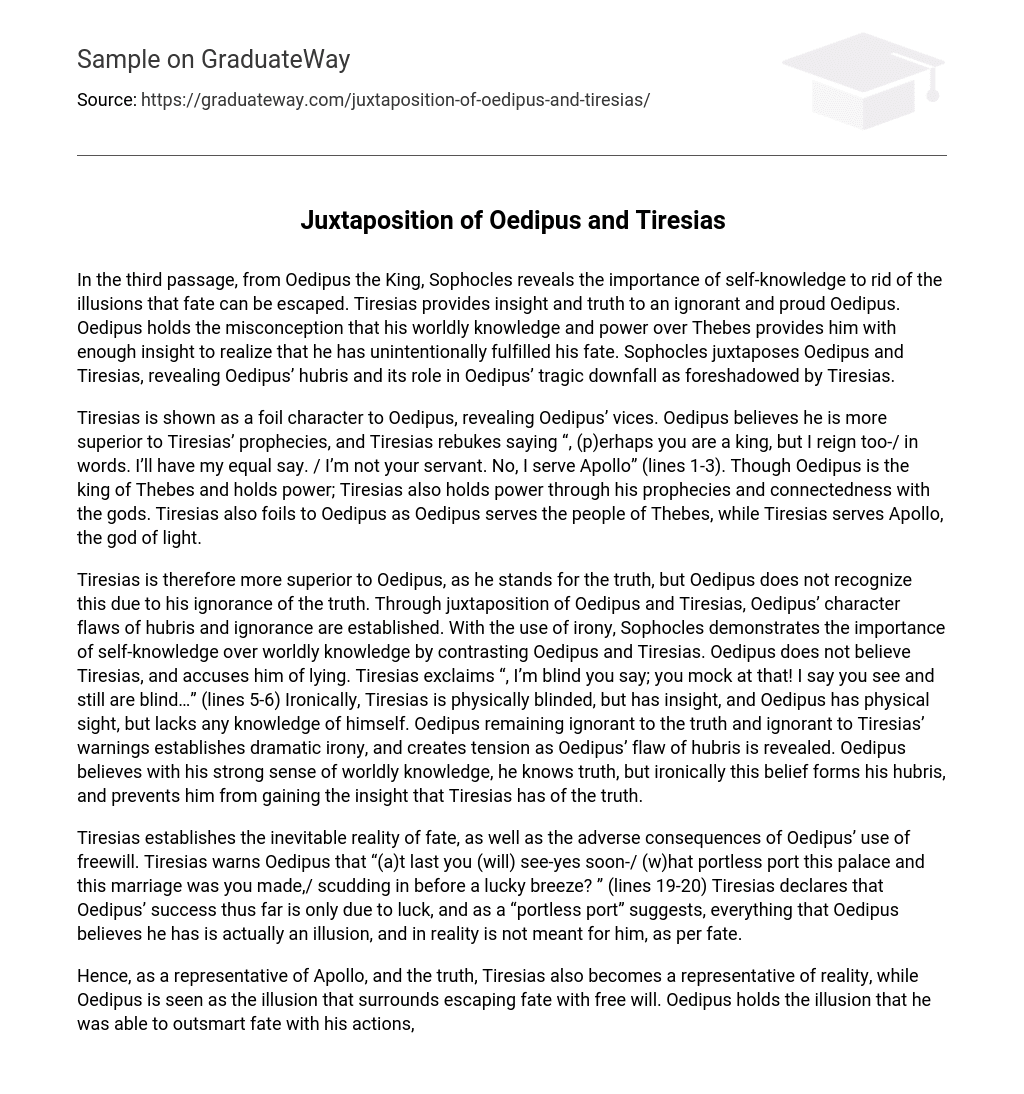In the third passage, from Oedipus the King, Sophocles reveals the importance of self-knowledge to rid of the illusions that fate can be escaped. Tiresias provides insight and truth to an ignorant and proud Oedipus. Oedipus holds the misconception that his worldly knowledge and power over Thebes provides him with enough insight to realize that he has unintentionally fulfilled his fate. Sophocles juxtaposes Oedipus and Tiresias, revealing Oedipus’ hubris and its role in Oedipus’ tragic downfall as foreshadowed by Tiresias.
Tiresias is shown as a foil character to Oedipus, revealing Oedipus’ vices. Oedipus believes he is more superior to Tiresias’ prophecies, and Tiresias rebukes saying “, (p)erhaps you are a king, but I reign too-/ in words. I’ll have my equal say. / I’m not your servant. No, I serve Apollo” (lines 1-3). Though Oedipus is the king of Thebes and holds power; Tiresias also holds power through his prophecies and connectedness with the gods. Tiresias also foils to Oedipus as Oedipus serves the people of Thebes, while Tiresias serves Apollo, the god of light.
Tiresias is therefore more superior to Oedipus, as he stands for the truth, but Oedipus does not recognize this due to his ignorance of the truth. Through juxtaposition of Oedipus and Tiresias, Oedipus’ character flaws of hubris and ignorance are established. With the use of irony, Sophocles demonstrates the importance of self-knowledge over worldly knowledge by contrasting Oedipus and Tiresias. Oedipus does not believe Tiresias, and accuses him of lying. Tiresias exclaims “, I’m blind you say; you mock at that! I say you see and still are blind…” (lines 5-6) Ironically, Tiresias is physically blinded, but has insight, and Oedipus has physical sight, but lacks any knowledge of himself. Oedipus remaining ignorant to the truth and ignorant to Tiresias’ warnings establishes dramatic irony, and creates tension as Oedipus’ flaw of hubris is revealed. Oedipus believes with his strong sense of worldly knowledge, he knows truth, but ironically this belief forms his hubris, and prevents him from gaining the insight that Tiresias has of the truth.
Tiresias establishes the inevitable reality of fate, as well as the adverse consequences of Oedipus’ use of freewill. Tiresias warns Oedipus that “(a)t last you (will) see-yes soon-/ (w)hat portless port this palace and this marriage was you made,/ scudding in before a lucky breeze? ” (lines 19-20) Tiresias declares that Oedipus’ success thus far is only due to luck, and as a “portless port” suggests, everything that Oedipus believes he has is actually an illusion, and in reality is not meant for him, as per fate.
Hence, as a representative of Apollo, and the truth, Tiresias also becomes a representative of reality, while Oedipus is seen as the illusion that surrounds escaping fate with free will. Oedipus holds the illusion that he was able to outsmart fate with his actions, but has unknowingly fulfilled his inescapable fate, represented by Tiresias. Oedipus’ tragic downfall is foreshadowed by Tiresias, revealing the destructive nature of Oedipus’ hubris. Tiresias cautions Oedipus: “What flood of sorrows-ah! You do not dream-/ will pull you down and level off your pride/ To make it match your children/ nd the creature that you are. ” (lines 21-24) Tiresias refers to Oedipus as no longer a king, or even a man, but as low as a creature. Oedipus is also compared with his children, products of sin, making Oedipus a sinful being as well. Oedipus’ excessive pride is targeted as his lesson to learn from his journey, and as the solution to destroying the barrier he formed to resist learning the truth. The condescending tone and personification of sorrows forewarns Oedipus to lose his current identity, and become identified only with the suffering that will consume him.
Tiresias’ prophecy indicates the suffering Oedipus will have to endure as a result of his hubris. Sophocles uses Tiresias as the representative of truth that brings out Oedipus’ fury and excessive pride, or hubris, for the first time in the play. This reveals Oedipus’ hamartia, and provides insight into Oedipus’ destiny that will lead him to his fate. Through the use of juxtaposition and irony, Oedipus’ hubris and lack of self-knowledge is established by Tiresias’ spiritual and intellectual superiority.





